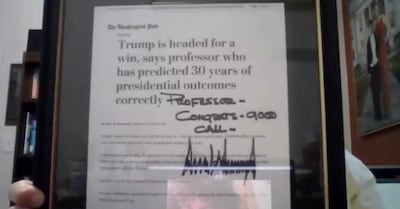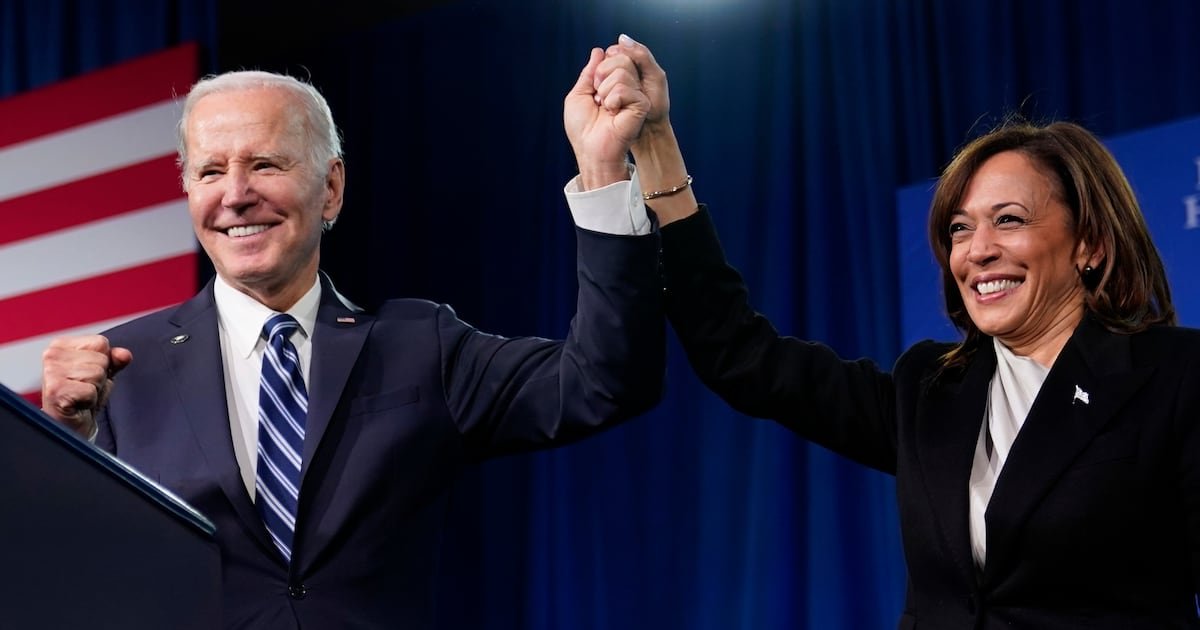There’s been no shortage of opinions about whether US President Joe Biden should continue his presidential campaign, after a shaky debate performance against former US President Donald Trump, but one opinion from a university professor is drawing a lot of attention.
Allan Lichtman, an American professor of history, rose to international prominence in 2016 when he correctly predicted the election of Mr Trump as president using his 13 keys system.
The academic now says it would not be wise for Mr Biden to drop out of this year’s election race.
“All of those pundits and journalists and political operatives who say Biden should drop out have absolutely no track record in predicting elections,” he said during his Lichtman Live YouTube show, which has reached 22,000 subscribers due to a surge in election interest and curiosity about Prof Lichtman’s prediction system.
If the pressure forces him to step aside, here’s what he should do
Allan Lichtman
“Yet they claim to know what the democrats should be doing to win this election, and once again, they’re trapped into looking at the polls. And all those same experts tracking the polls told us Hillary Clinton couldn’t lose.”
While he hasn’t made his final election prediction yet, under Prof Lichtman’s 13 keys system, Mr Biden currently holds the advantage, with the incumbency key fully secured, among other keys such as a strong long-term economy, strong short-term economy and lack of major scandal.
However, if Mr Biden decides not to run, Democrats would lose the incumbency key, and potentially lose the contest key if Mr Biden’s decision prompts a chaotic Democratic convention later in August.
“Right now Biden checks off the incumbency key and the contest key because he was unchallenged for his renomination, that means six of the remaining 11 keys would have to fall to count him out,” Prof Licthman said.
“But if Biden steps down and there’s a brawl to succeed him because there’s no consensus choice, the Democrats lose both of those keys and only four more keys would have to fall to predict his defeat.”
‘Plan B’
There is, however a caveat, according to Prof Lichtman, that would allow for the democratic party to keep the incumbency and contest keys even if Biden decides not to run.
“I do have a Plan B,” he said during his show.
“It is possible, although I don’t have any inside information, but there is tremendous pressure for Biden to step aside. If that pressure forces him to step aside, here’s what he should do.
“He should resign the presidency for the good of the country, that would be greatly applauded by the American people.
“Kamala Harris, much younger, no issue about her mental sharpness would become president, that would check off the incumbency key, and Biden would release all his delegates to support Harris at the convention to avoid an internal party fight, and that would also check off the contest key.
“That is a much preferable Plan B, if in fact the spineless Democrats force Biden out of this race.”
The other scenario, again hypothetical, where Mr Biden would simply announce he doesn’t plan to pursue re-election, but remain as US president until election day, wouldn’t work, according to Prof Lichtman.
“If he resigns, not just steps aside from the candidacy, she retains the incumbency key and if he instructs all the delegates to support Kamala Harris, which he can, she would also retain the party contest key, and that is by far, the best Plan B,” he said, before pivoting to what he felt was less-than-ideal situation.
“The worst would be for Biden just to step out of the candidacy and have a big brawl for the successor.”
An uncertain and potentially chaotic convention, similar to the 1968 Democratic convention after the assassination of Robert F Kennedy, could create a confidence vacuum and waste valuable campaign resources, potentially giving Mr Trump a frictionless path to the White House.
Who is Allan Lichtman and what has he predicted?
While known in various political science circles for much of his career, Prof Lichtman broke through to the mainstream right before the 2016 US presidential election when he accurately predicted Donald Trump would defeat heavily favoured Hillary Clinton.
That prediction went against many polls and analyses at the time.
Shortly after Mr Trump won the White House in 2016, he sent Prof Lichtman a signed note.
“Professor, congrats, good call,” the note read.

Prof Lichtman, however, was also among the first to predict that Mr Trump would be impeached, which came to fruition in 2021 shortly after the insurrection he incited following his electoral defeat to Mr Biden in the 2020 election.
As for the 2024 US presidential election, Prof Lichtman said he’s not ready to lock in a prediction yet, although his prediction system currently favours Mr Biden.
“I have not made final prediction,” he said several weeks ago during a live-stream on his YouTube page. “I hope to make it about the same time as I made it in 2020, which was August,” he explained.
Prof Lichtman has also been critical of recent polls, insisting that this far before elections, they hold little, if any predictive value.
“That’s the same kind of mistake that led the pollsters and pundits to be so dramatically wrong in 2016, to be wrong in 1988 and to be wrong in 2012,” he said.
How does Lichtman’s 13 keys model work?
The 13 keys to the White House is an index of true or false responses to a set of questions, based on a simple pattern recognition algorithm.
“True” answers favour the re-election of the incumbent, while “false” answers favour the challenger.
When six or more of the statements are false, the incumbent party is predicted to lose.
Lichtman’s 13 keys to the White House:
- Party mandate: After the midterm elections the incumbent party holds more seats in the US House of Representatives than it did after the previous midterm elections.
- Contest: The candidate is nominated on the first ballot and wins at least two-thirds of the delegate votes.
- Incumbency: The sitting president is the party candidate.
- Third party: A third-party candidate wins at least 5 per cent of the popular vote.
- Short-term economy: The National Bureau of Economic Research has either not declared a recession, or has declared it over prior to the election.
- Long-term economy: Real per-capita economic growth during the term equals or exceeds the mean growth during the previous two terms.
- Policy change: The administration achieves a major policy change during the term comparable to the New Deal or the first-term Reagan Revolution.
- Social unrest: There is no social unrest during the term that is comparable to the upheavals of the post-civil war Reconstruction or of the 1960s, and is sustained or raises deep concerns about the unravelling of society.
- Scandal: There is no broad recognition of a scandal that directly touches upon the president
- Foreign or military failure: There is no major failure during the term comparable to Pearl Harbor or the Iran hostage crisis that appears to significantly undermine America’s national interests or threaten its standing in the world.
- Foreign or military success: There is a major success during the term comparable to the winning of the Second World War or the Camp David Accords that significantly advances America’s national interests or its standing in the world.
- Incumbent charisma: The incumbent party candidate is a national hero comparable to Ulysses Grant or Dwight Eisenhower or is an inspirational candidate comparable to Franklin Roosevelt or Ronald Reagan.
- Challenger charisma: The challenger party candidate is not a national hero comparable to Ulysses Grant or Dwight Eisenhower and is not an inspirational candidate comparable to Franklin Roosevelt or Ronald Reagan.
– Source: Allan J. Lichtman, The Thirteen Keys to the Presidency
Rise to prominence
While widely known in various political science circles for many years, Prof Lichtman’s media appearances and interview requests became prolific shortly after he predicted Mr Trump’s election.
He has since been interviewed by media outlets all over the world, all seeking to gain insights that don’t necessarily focus on polling.
There was, however, a discrepancy with one of his predictions during the 2000 election between Al Gore, US vice president at the time, and George W Bush, who was Texas governor.
Prof Lichtman predicted a victory for Al Gore, and while this came to fruition in terms of the popular vote, controversy over vote tallies in Florida, and ultimately a Supreme Court decision gave Mr Bush the electoral college victory, a controversy which still generates ample debate to this day.
“Gore, based on the actual verdict of the voters was the winner. What happened in Florida was voter suppression,” Prof Lichtman said during a 2023 interview with The National. “And I wasn’t the only one to come to that conclusion.”
It’s not politics all the time for Prof Lichtman, however, who is also an avid distance runner and author of 11 books.
Long before his election prediction fame, in 1981 he had a successful series of victories on popular US game show, Tic Tac Dough
“I won more than $100,000 dollars in cash and prizes on that show,” he said. “I was on for four weeks and defeated 20 opponents,” he added, noting that his lengthy run on the show helped to prepare him for his countless TV and media interviews.
“Not only do you have to know a lot, but you can’t freeze. It takes a lot of stamina, they taped five shows in one day, and there were always technical glitches and sometimes the recordings would go late into the night,” he recalled.
Updated: July 04, 2024, 10:07 AM
